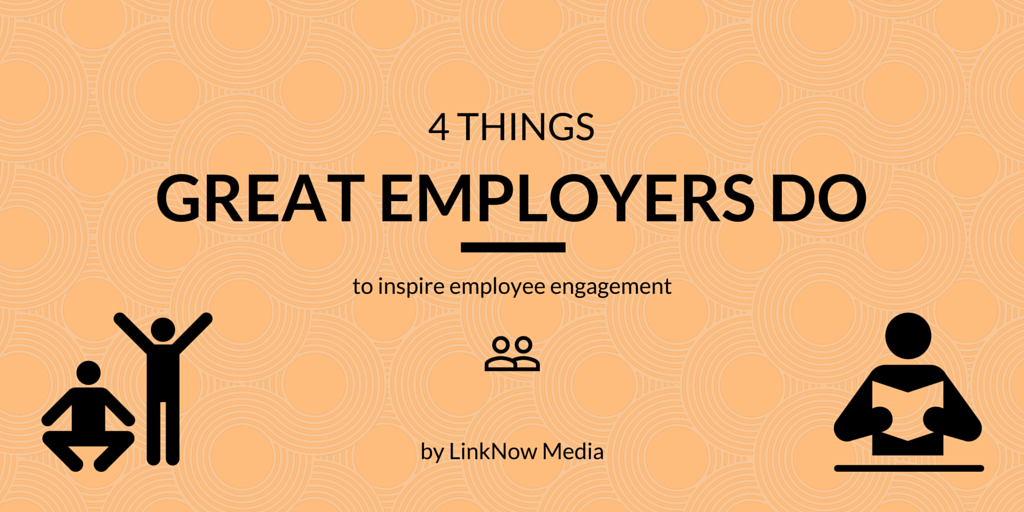
Companies today know that one of their biggest challenges to productivity is keeping employees engaged. Fostering productivity, innovation, and employee happiness simultaneously is no easy task, but by observing other successful companies, we can begin to see common threads that take certain companies from being good employers to great employers.
While some may think creating a great working environment is about having a cool office space, remote working arrangements, and creative perks, the reality is that the best way to engage your employees is by strengthening the emotional ties that deeply connect them to your fellow staff, managers, and teams.
Typically workers who are actively disengaged outnumber their engaged colleagues by an overwhelming factor of 2:1. Luckily,
Gallup uncovered 32 companies (collectively employing 600,000 people) across seven industries that have managed to shift that ratio so that not only are engaged employees outranking unengaged ones, but they are doing so at a 9:1 ratio. Here are some of the top things these companies had that set them apart.
1. They have leaders who want to improve.
Initiative is contagious. When you have leaders that are involved and curious enough, their positive attitude will trickle down to the rest of the employees.
It’s not just about having leaders who say that what they want to see in others. It’s about having leaders that will be the example. When lower-ranked employees witness leaders continuously striving for self-improvement, they can directly apply that attitude to their own work.
2. They have excellent HR people.
Usually, executives do not tend to be the best managers. The real value of HR is to bridge the gap between executives and employees.
Truly talented HR experts will guide executives towards developing healthy, mutual rapports with their employees. When employees feel supported, they naturally want to excel. Even better, when executives see employees excelling, they are more optimistic about the business challenges ahead of them.
3. They meet basic needs for employees before asking them for more.
Employees need to feel supported in their basic, day-to-day tasks before employers can throw heavier workloads or greater responsibility at them.
If employees feel overwhelmed, overworked, and under-supported from the get-go, employers should not expect employees to be willing to go that extra mile for them when they really need it.
4. They don’t use circumstance as an excuse for neglecting employees.
Employee engagement is not contingent on the economy or any other challenge the company may be currently facing. On the contrary, employee engagement should be heightened and strengthened when the company is going through rougher times because that’s when companies need their employees to perform the best.
Sometimes a company may feel limited in what they can provide for their employees because of a perceived lack of resources. Pay raises and bonuses are not the only way to motivate employees, and it’s up to management to get creative about how they go about engaging employees.
When companies allow themselves to see financial, operational, or managerial limitations as an excuse to neglect working on employee engagement, chances are they will never get around to it. Sometimes all it takes is coming up with a better way to publicly acknowledge everyone’s hard work or throwing a small get together on a Friday, so everyone can unwind.
Conclusion
Strategies like these help companies take employee engagement over the top. When employees are engaged, companies work faster, more efficiently, and in more creative and strategically minded ways. If that’s not evidence enough that employee engagement is important, we aren’t sure what is!
 Companies today know that one of their biggest challenges to productivity is keeping employees engaged. Fostering productivity, innovation, and employee happiness simultaneously is no easy task, but by observing other successful companies, we can begin to see common threads that take certain companies from being good employers to great employers.
While some may think creating a great working environment is about having a cool office space, remote working arrangements, and creative perks, the reality is that the best way to engage your employees is by strengthening the emotional ties that deeply connect them to your fellow staff, managers, and teams.
Typically workers who are actively disengaged outnumber their engaged colleagues by an overwhelming factor of 2:1. Luckily, Gallup uncovered 32 companies (collectively employing 600,000 people) across seven industries that have managed to shift that ratio so that not only are engaged employees outranking unengaged ones, but they are doing so at a 9:1 ratio. Here are some of the top things these companies had that set them apart.
Companies today know that one of their biggest challenges to productivity is keeping employees engaged. Fostering productivity, innovation, and employee happiness simultaneously is no easy task, but by observing other successful companies, we can begin to see common threads that take certain companies from being good employers to great employers.
While some may think creating a great working environment is about having a cool office space, remote working arrangements, and creative perks, the reality is that the best way to engage your employees is by strengthening the emotional ties that deeply connect them to your fellow staff, managers, and teams.
Typically workers who are actively disengaged outnumber their engaged colleagues by an overwhelming factor of 2:1. Luckily, Gallup uncovered 32 companies (collectively employing 600,000 people) across seven industries that have managed to shift that ratio so that not only are engaged employees outranking unengaged ones, but they are doing so at a 9:1 ratio. Here are some of the top things these companies had that set them apart.

 Companies today know that one of their biggest challenges to productivity is keeping employees engaged. Fostering productivity, innovation, and employee happiness simultaneously is no easy task, but by observing other successful companies, we can begin to see common threads that take certain companies from being good employers to great employers.
While some may think creating a great working environment is about having a cool office space, remote working arrangements, and creative perks, the reality is that the best way to engage your employees is by strengthening the emotional ties that deeply connect them to your fellow staff, managers, and teams.
Typically workers who are actively disengaged outnumber their engaged colleagues by an overwhelming factor of 2:1. Luckily, Gallup uncovered 32 companies (collectively employing 600,000 people) across seven industries that have managed to shift that ratio so that not only are engaged employees outranking unengaged ones, but they are doing so at a 9:1 ratio. Here are some of the top things these companies had that set them apart.
Companies today know that one of their biggest challenges to productivity is keeping employees engaged. Fostering productivity, innovation, and employee happiness simultaneously is no easy task, but by observing other successful companies, we can begin to see common threads that take certain companies from being good employers to great employers.
While some may think creating a great working environment is about having a cool office space, remote working arrangements, and creative perks, the reality is that the best way to engage your employees is by strengthening the emotional ties that deeply connect them to your fellow staff, managers, and teams.
Typically workers who are actively disengaged outnumber their engaged colleagues by an overwhelming factor of 2:1. Luckily, Gallup uncovered 32 companies (collectively employing 600,000 people) across seven industries that have managed to shift that ratio so that not only are engaged employees outranking unengaged ones, but they are doing so at a 9:1 ratio. Here are some of the top things these companies had that set them apart.

